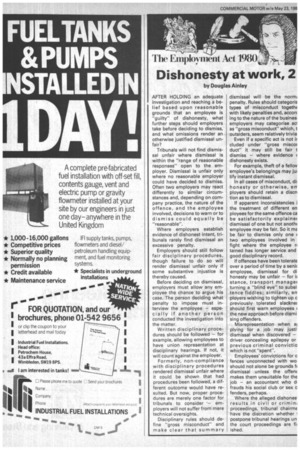The Employment Act 198k Dishonesty at work, 2
Page 70

If you've noticed an error in this article please click here to report it so we can fix it.
by Douglas Ainley
AFTER HOLDING an adequate investigation and reaching a belief based upon reasonable grounds that an employee is "guilty" of dishonesty, what further steps should employers take before deciding to dismiss, and what omissions render an otherwise justified dismissal unfair?
Tribunals will not find dismissal unfair where dismissal is within the "range of reasonable responses" open to the employer. Dismissal is unfair only where no reasonable employer could have decided to dismiss. Often two employers may react differently to similar circumstances and, depending on company practice, the nature of the offence, and the employee involved, decisions to warn or to dismiss could equally be "reasonable".
Where employers establish evidence of dishonest intent, tribunals rarely find dismissal an excessive penalty.
Employers should still follow fair disciplinary procedures, though failure to do so will render dismissal unfair only if some substantive injustice is thereby caused.
Before deciding on dismissal, employers must allow any employee the chance to argue his case. The person deciding what penalty to impose must interview the employee — especially if another person conducted the investigation into the matter.
Written disciplinary procedures should be followed — for example, allowing employees to have union representation at disciplinary hearings. If not, it will count against the employer.
Formerly, non-compliance with disciplinary procedures rendered dismissal unfair where it could be shown that had procedures been followed, a different outcome would have resulted. But now, proper procedures are merely one factor for tribunals to consider '— employers will not suffer from mere technical oversights.
Disciplinary rules should define "gross misconduct" and make clear that summary dismissal will be the norm; penalty. Rules should categoris types of misconduct togethE with likely penalties and, accon ing to the nature of the busines: employers may categorise ad as "gross misconduct" which, t outsiders, seem relatively trivia Even if a specific act is not ir cluded under "gross miscor duct" it may still be fair t dismiss — where evidence dishonesty exists.
For example, theft of a felloy employee's belongings may ju: tify instant dismissal.
In all cases of misconduct, di: honesty or otherwise, err plovers should retain a discn tion as to dismissal.
If apparent inconsistencies i the treatment of different en ployees for the same offence ca be satisfactorily explainec dismissal of one but not anoth employee may be fair. So it me be fair to dismiss only one c two employees involved in fight where the employee n tamed has longer service and good disciplinary record.
If offences have been tolerate over a period of time by a set* employee, dismissal for di honesty may be unfair — for ii stance, transport manager turning a "blind eye" to subsi. tence fiddles; similarly, en ployers wishing to tighten up previously tolerated slackner should first warn employees e the new approach before dismi sing offenders.
Misrepresentation when al plying for a job may justi• dismissal when discovered — driver concealing epilepsy or previous criminal convictio which is not "spent".
Employees' convictions for fences unconnected with wo should not alone be grounds fe dismissal unless the often( makes them unsuitable for the job — an accountant who frauds his social club or sex o fenders, perhaps.
Where the alleged dishones. results in civil or crimini proceedings, tribunal chairmE have the discretion whether 1 postpone tribunal hearings un. the court proceedings are fil ished.




































































































